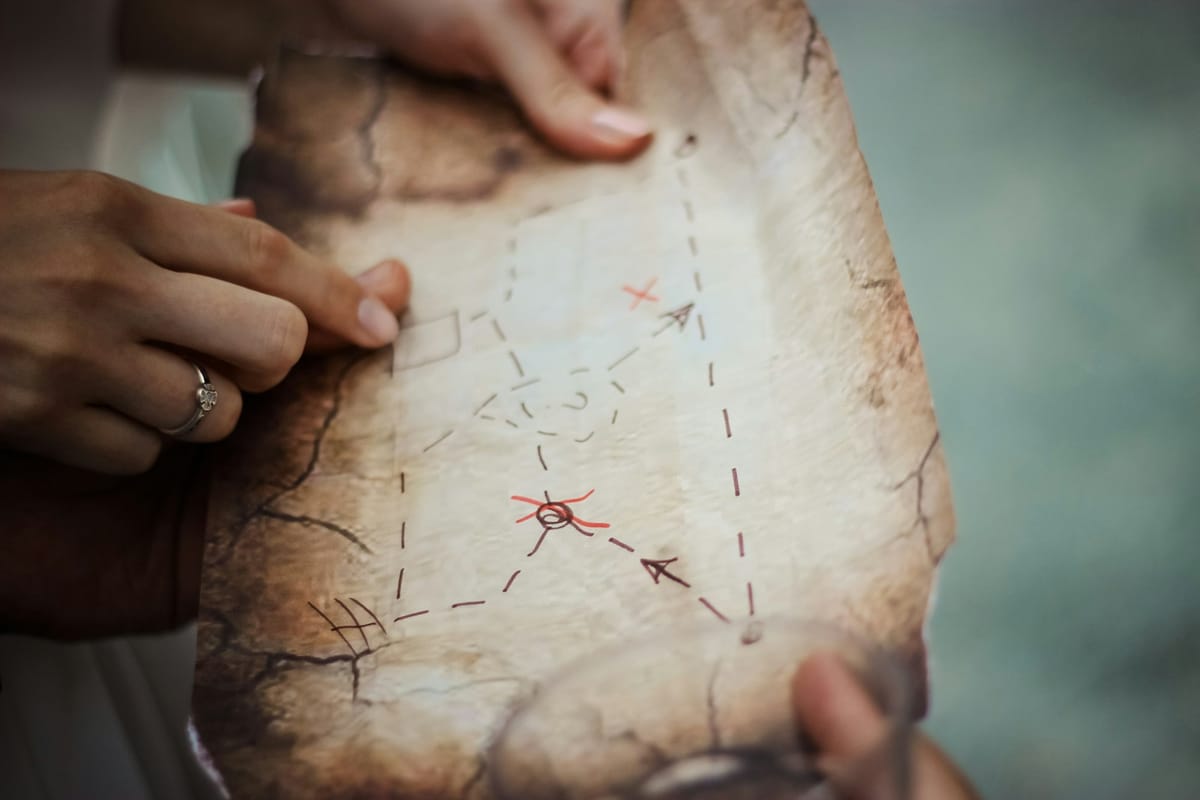Treasure Hunting 101: How to Find Hidden Money in Your House

Did you know that over 3 million shipwrecks are estimated still to hold hidden treasures beneath the ocean's surface? Treasure hunting has captivated explorers for centuries, with the promise of discovering riches beyond imagination. From ancient artifacts to sunken treasure chests, the thrill of uncovering these lost fortunes continues to lure adventurers worldwide.
Join us as we delve into the exciting world of treasure hunting, where each dive or expedition holds the potential for an extraordinary discovery. Get ready to embark on a journey filled with mystery, history, and the allure of striking it rich in the most unexpected places.
Understanding Treasure Hunting
History
Treasure hunting has a rich history, dating back centuries to when explorers sought out hidden riches. In the 19th century, the discovery of shipwrecks like the Titanic sparked a fascination with underwater treasures.
Types of Treasures
Treasures come in various forms, from sunken ships laden with gold and jewels to ancient artifacts buried in the ground. Treasure hunters seek gold coins, precious gems, and historical relics.
Legal Aspects and Ethics
Legal regulations surrounding treasure hunting vary by location, with some countries requiring permits or licenses to search for treasures. Ethical dilemmas can arise when dealing with cultural artifacts or items of historical significance, prompting discussions on responsible excavation practices.

Essential Tips for Success
Research Area
Before embarking on a treasure hunt, research the area thoroughly to understand its history and any potential hidden treasures. Look for clues in historical records or local folklore.
Quality Equipment
Invest in quality metal detectors and tools to increase your chances of finding valuable items. These tools can precisely detect metals buried underground.
Join Clubs
Consider joining local treasure hunting clubs to connect with experienced hunters who can provide valuable insights and tips. These clubs often organize group hunts and share information about the best spots to search.
Top Treasure Hunting Spots
Famous Locations
Explore renowned treasure hunting spots such as the Oak Island Money Pit in Nova Scotia. Discover the mystery surrounding this site and its intriguing history. Uncover treasures like the Lost Dutchman Mine in Arizona, known for its elusive gold deposits.
Lesser-Known Gems
Delve into hidden gems like Dead Man's Chest Beach in Madagascar, which offers a blend of adventure and history. Reveal the secrets of Snake Island in Brazil, which is rumored to hold ancient artifacts waiting to be found.
Access and Navigation Tips
- Research: Conduct thorough research on the chosen location before embarking on your journey.
- Equipment: Pack essential tools such as metal detectors, shovels, and GPS devices for efficient hunting.
- Local Guidance: Seek advice from locals or hire experienced guides familiar with the area.
- Respect Regulations: Adhere to local laws and regulations when exploring these sites to ensure preservation.

Innovative Searching Techniques
Metal Detecting
Advanced metal detecting technology has revolutionized treasure hunting, allowing enthusiasts to uncover hidden treasures precisely. By utilizing state-of-the-art metal detectors, treasure hunters can detect valuable artifacts buried deep underground or concealed within structures.
Drone Technology
The integration of drones in treasure hunting has opened up a new realm of possibilities for enthusiasts. Drones provide a bird's-eye view of vast terrains, enabling treasure hunters to scout remote locations efficiently. This technology aids in identifying potential treasure sites that are inaccessible by foot.
Underwater Exploration
Underwater treasure hunting involves using specialized equipment, such as scuba gear and underwater metal detectors, to search for sunken treasures. With technological advancements, divers can explore shipwrecks and submerged ruins with greater ease and accuracy, uncovering treasures that have been lost for centuries.
Unconventional Treasure Sources
Urban Exploration
Urban areas offer unique opportunities for treasure hunting. Abandoned buildings and sites hold untold riches, and explorers can uncover treasure troves in unexpected places within city limits.
Venturing into forgotten corners of cities can lead to discovering valuable items like old books, antiques, and trunks filled with hidden treasures. The thrill of urban treasure hunting lies in the mystery and excitement of what might be found.
Industrial Sites
Exploring abandoned industrial sites presents a fascinating opportunity for treasure hunters. These locations often hold relics from the past, such as machinery parts, tools, and even valuable artifacts left behind by previous occupants.
The remnants of industry can hide valuable treasures waiting to be unearthed by intrepid explorers. Each rusted piece of equipment or forgotten item tells a story of the past, adding allure to the hunt for hidden gems.
Exploring Home for Hidden Wealth
Tips for Finding Valuables
Explore hiding places like basements, closets, and walls when searching for hidden treasures in your home. Look for loose bricks, unusual openings, or hidden compartments that could conceal money or valuables.
Remember to check old furniture, especially in the back of drawers or beneath cushions, where people often hide their cash. Don't overlook common hiding spots like inside books, under mattresses, or behind picture frames. These are prime locations for stashing away valuable items.
Value of Antique Discoveries
Antique items and collectibles found within your home can hold significant value. Items such as rare coins, vintage jewelry, or historical artifacts can be worth much to collectors and enthusiasts. Keep an eye out for unique pieces that may have been overlooked or underestimated in their worth.
Stories of Unexpected Finds
Many homeowners have stumbled upon valuable items in unexpected places within their homes. From discovering a stash of old coins hidden in a forgotten closet to finding antique currency tucked away in the attic, these stories highlight the thrill of uncovering hidden wealth right under your nose.
Alternative Treasure Discovery Methods
Historical Maps
Historical maps and documents are valuable resources for treasure hunters, providing clues to hidden treasures from the past. By studying old maps and texts, enthusiasts can uncover potential locations for valuable artifacts or riches.
Geocaching
Geocaching offers a modern twist on treasure hunting. Participants use GPS coordinates to locate hidden containers or "caches" worldwide. They engage in a high-tech scavenger hunt, exploring diverse locations in search of hidden treasures.
Benefits of Events
Participating in treasure hunting events and competitions not only offers the thrill of the hunt but also fosters community engagement and teamwork. These events bring together individuals with a shared passion for exploration and discovery.

Maximizing Passive Income Opportunities
Renting Out Metal Detectors
Consider renting out metal detectors as a lucrative option for generating extra cash. By offering this service, individuals can capitalize on the growing interest in treasure hunting activities. Renting out metal detectors allows enthusiasts to explore new locations without investing in expensive equipment upfront.
Metal detecting rentals can cater to a wide range of customers, from beginners looking to try out the hobby to seasoned treasure hunters seeking specialized equipment. This approach provides a steady income stream and fosters community engagement by encouraging more people to participate in treasure hunting adventures.
Creating a Treasure Hunting Blog or YouTube Channel
Venture into the digital realm by establishing a treasure hunting blog or YouTube channel to share experiences, tips, and discoveries with a broader audience. Through engaging content such as tutorials, vlogs, and artifact showcases, individuals can attract followers and monetize their platforms through ads, sponsorships, and affiliate marketing.
A treasure hunting blog or YouTube channel offers endless possibilities for creativity and storytelling, allowing enthusiasts to showcase their passion for exploration and history while generating passive income from their online presence.
Closing Thoughts
Now that you've delved into the world of treasure hunting, armed with essential tips and innovative techniques, it's time to put your newfound knowledge into action. Explore the top treasure hunting spots, think outside the box for unconventional sources, and don't forget to check your own home for hidden wealth. By maximizing passive income opportunities and embracing alternative discovery methods, you're on the right track to uncovering hidden treasures. Remember, persistence and creativity are key to this exciting adventure!
Frequently Asked Questions
Is treasure hunting legal?
Yes, treasure hunting is legal in many places as long as you have the necessary permits and adhere to regulations. Research local laws and obtain permissions before embarking on any treasure hunting activities.
What equipment do I need for treasure hunting?
Essential equipment for treasure hunting includes a metal detector, shovel, gloves, and a pouch for storing found items. Additional tools like a trowel or sifter may be beneficial depending on the location and type of treasure hunt.
How can I maximize my chances of finding treasures?
To increase your chances of finding treasures, research the area you plan to explore extensively, use proper metal detecting techniques, search during optimal times (early mornings or late afternoons), and consider joining local treasure hunting clubs for valuable tips and insights.
Are there risks involved in treasure hunting?
While treasure hunting can be an exciting hobby, potential risks include encountering hazardous materials, damaging historical artifacts unknowingly, and trespassing on private property. It's crucial to prioritize safety by wearing protective gear and respecting rules and regulations.
Can I make money from treasure hunting?
While valuable items can be found during treasure hunts, making a consistent income solely from treasure hunting can be challenging. However, some enthusiasts supplement their income by selling found items online or offering metal detecting services to others interested in the hobby.
Gigs Money Tips
Financial Planning tips for Gig Economy Workers.




